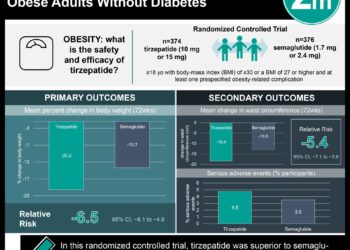Decreased sleep in childhood linked to later central adiposity
Image: PD
1. Children with chronically low levels of sleep from infancy to early childhood were found to have higher overall and central adiposity.
2. Outcomes of obesity at age 7 could not be attributed to a specific critical period of time when children lacked sleep, but rather was due to chronic sleep curtailment.
Evidence Rating Level: 1 (Excellent)
Study Rundown: Studies have shown that over the last 20 years, children are getting fewer hours of sleep, which has been associated with a higher risk of obesity, hypertension, and elevated hemoglobin A1c levels. However, little is known about whether or not there is a “critical period” in which curtailed sleep is highly associated with adverse anthropometric outcomes. The current study focused on the association between sleep and adiposity and prospectively evaluated the potential existence of a critical period in the development of obesity. It was found that children with a chronically low amount of sleep had higher central adiposity at age 7. There was no evidence of a critical period of lack of sleep. This study may be limited by its lack of generalizability and by subjective measures of sleep reporting by mothers. These findings may help physicians in counseling parents about risk factors for obesity in childhood.
Click to read the study published today in Pediatrics
Relevant Reading: A dose-response relationship between short sleeping hours and childhood obesity: results of the Toyama birth cohort study
In-Depth [prospective cohort study]: A total of 1046 children from Project Viva (a prospective, pre-birth cohort which recruited pregnant women) were included in this study. Sleep data was characterized by mothers’ reports of their children’s sleep duration in a typical 24 hour period at age 6 months, 1 year, and every year thereafter to age 7. Sleep duration for each time period was coded on a scale of 0 (lowest amount of sleep) to 13 (highest amount of sleep). Lower sleep scores were associated with greater hours of television viewing, race (black, Hispanic, other race/ethnicity), lower household income families, and lower maternal education. Children who had sleep scores from 0 to 4 had higher BMI z scores, sum of subscapular and triceps skinfold thickness, total and truck fat mass indices, waist and hip circumferences, and higher odds of obesity. In multivariate analysis, children in all three age periods (6 months to 2 years, 3 to 4 years, and 5 to 7 years) with the least amount of sleep had the highest anthropometric indices.
More from this author: Parental smoking associated with smoking behavior in adolescence, Food advergames linked to increased caloric intake in children, Potential association between toddler behavior and infant media exposure, ADHD stimulant treatment associated with changes in BMI trajectory, Current BMI standards may be predictive of metabolic syndrome
©2012-2014 2minutemedicine.com. All rights reserved. No works may be reproduced without expressed written consent from 2minutemedicine.com. Disclaimer: We present factual information directly from peer reviewed medical journals. No post should be construed as medical advice and is not intended as such by the authors, editors, staff or by 2minutemedicine.com. PLEASE SEE A HEALTHCARE PROVIDER IN YOUR AREA IF YOU SEEK MEDICAL ADVICE OF ANY SORT.







![New drug for Chagas disease shows antitrypanosomal activity [CHAGASAZOL trial]](https://www.2minutemedicine.com/wp-content/uploads/2014/05/t-cruzi-75x75.jpg)